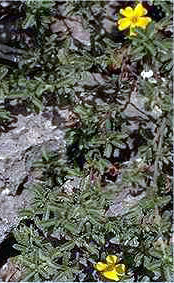
|
|
| Damiana Leaf - Turnera diffusa - Turneraceae - Mexico, Central and South America and the West Indies |
|
Damiana is a small shrub with aromatic leaves found throughout Mexico, Central and South America and the West Indies. The botanical name of the plant describes its use as an aphrodisiac. For more than 100 years, Damiana's use has been associated with improving sexual function in both males and females. Damiana acts as an anti depressant, tonic, diuretic, to treat coughs and as a mild laxative. It is said to relieve headaches, control bed-wetting, and stimulate muscular contractions of the intestinal tract. Damiana is a stimulating nerve tonic used for debility, depression and lethargy. Damiana is held in high repute by Mexican herbalists, particulary as an aphrodisiac, prescribed as a thick decoction before bedtime. The leaves contain the antimicrobial hydroquinone arbutin, various volatile oils which also have an antimicrobial action, and various flavonoids. Also, damiana extracts have been shown, in the test tube, to weakly bind to progesterone receptors. Damiana may thus be a potentially useful herb for some female health problems. Modern herbal physicians conclude that damiana has a definite tonic action on the central nervous and the hormonal system. As a useful anti-depressant, damiana is considered to be a specific in cases of anxiety and depression where there is a sexual factor. It may be used to strengthen the male sexual system. TRADITIONAL PREPARATION: Damiana makes a fragrant, sparkling tea with a delicious aroma and an agreeable bitter taste. The Aztecs would drink a mixture consisting of 32 grams of fresh leaves boiled for 15 minutes in approximately 1 liter of water. Often, a pipe of damiana would be smoked to increase the desired effect. |
|
| Related
Articles : |
|
| Email
This Article To A Friend - Print
This Article Articles can be E-mailed to a friend and you can get a printable version of the article. Use your own buttons and links! |
|
